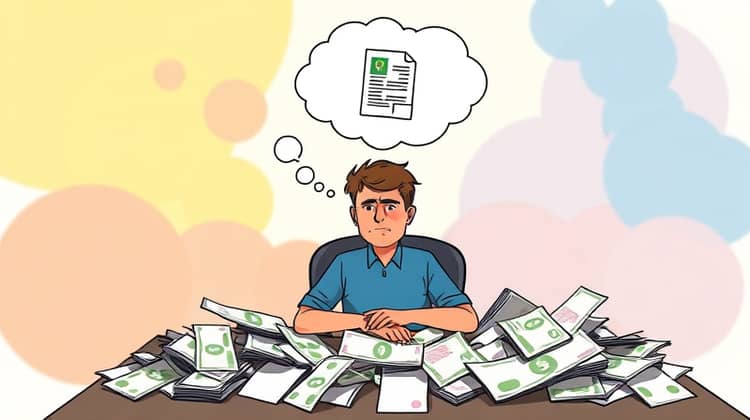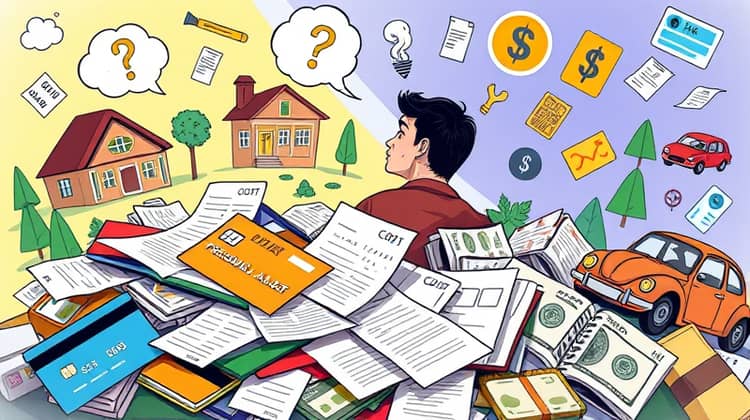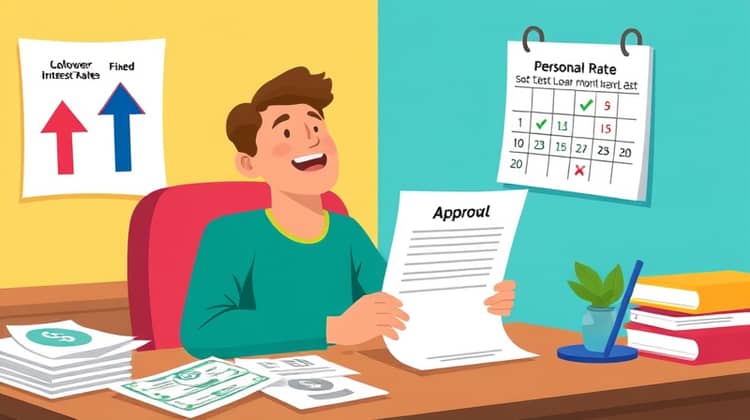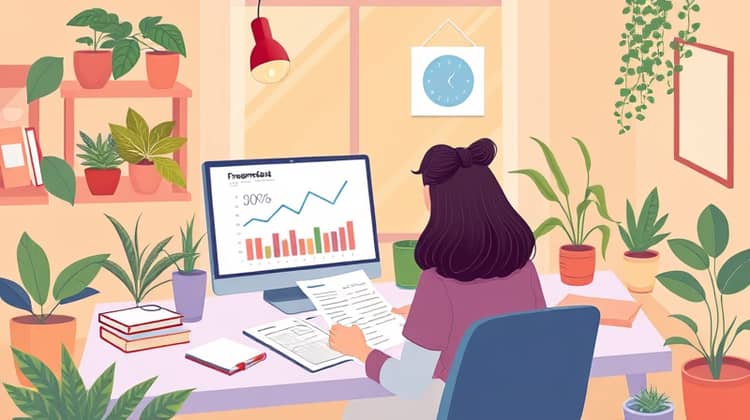Debt Consolidation Simplified: Using Personal Loans Effectively

Managing debt can sometimes feel overwhelming, especially when multiple payments and high interest rates are in play. Debt consolidation presents an appealing solution to many individuals seeking to simplify their financial obligations. Understanding the ins and outs of debt consolidation can help you make informed decisions about your personal finances.
When you consider debt consolidation, it's important to grasp not only what it means but also the various types of debts eligible for consolidation and the benefits it can offer. Many people think of consolidation in terms of personal loans, which can be a strategic choice to streamline payments and possibly lower overall interest rates.
This article provides a comprehensive guide to debt consolidation, covering its definition, benefits, types of debt that can be consolidated, and steps to take if you plan to use a personal loan for this purpose. We'll also discuss potential drawbacks and alternatives, along with tips for success.
What is Debt Consolidation?

Debt consolidation is a financial strategy that involves combining multiple debts into a single loan. This is often done to simplify the management of payments and to potentially secure a lower interest rate. By consolidating, borrowers can focus on paying off one debt rather than juggling multiple payments to various creditors.
Many consumers find themselves overwhelmed by numerous bills due at different times, leading to confusion and missed payments. Debt consolidation simplifies this by merging various debts into one payment, reducing stress and administrative hassle.
While it can be an effective financial tool, it is crucial to evaluate your overall financial situation and understand the terms of the consolidation before proceeding. Not all debts are suitable for consolidation, and sometimes it might not address the underlying habits that led to debt in the first place.
Benefits of Debt Consolidation

One of the main advantages of debt consolidation is the opportunity to secure a lower interest rate. This can result in significant savings over time, making it easier to pay off debts faster.
In addition to potentially lower interest rates, consolidation often simplifies the payment process. Instead of managing several monthly payments with varying due dates, individuals can streamline their budget to focus on just one payment each month.
- Simplifies monthly payments
- May reduce interest rates
- Can improve credit score by decreasing credit utilization
- Improves financial organization
- Offers potential for lower monthly payments
These benefits demonstrate why many individuals consider debt consolidation as a viable option to manage their debts effectively. However, it's essential to proceed with caution, as not all debt consolidation scenarios lead to positive outcomes. Take the time to assess your situation thoroughly to ensure that you're making the right decision.
Types of Debt Eligible for Consolidation

Variety exists when it comes to the types of debts eligible for consolidation. While some debts can be consolidated, others generally cannot, and knowing the difference can be essential. Common debts that can be consolidated include credit card debt, personal loans, and medical bills.
Credit cards often carry high-interest rates, so consolidating them into a personal loan with a lower rate can be particularly beneficial. Other unsecured debts that are more manageable with a single loan include student loans and personal loans that aren't tied to assets.
On the other hand, secured debts like mortgages or auto loans typically cannot be consolidated in the same way because those debts are attached to collateral. Understanding which debts you can consolidate is crucial for making effective financial decisions.
- Credit card debts
- Personal loans
- Medical bills
- Unsecured loans
- Student loans
Once you understand which debts can be consolidated, you can better strategize your approach to debt management and take significant steps toward enhancing your financial situation. However, evaluating each type of debt critically is fundamental to ensuring you choose the right consolidation method.
Why Use a Personal Loan for Debt Consolidation?

A personal loan can be a practical method of consolidating debt, especially if it comes with a lower interest rate than existing debts. By doing this, you can reduce the overall cost of borrowing and pay down your debt more rapidly.
Moreover, personal loans typically have fixed interest rates, which can provide borrowers with predictability in their monthly payments. This stability can be particularly helpful when managing a budget, as you'll know exactly how much to allocate each month.
- Lower interest rates than credit cards
- Fixed monthly payments provide budgeting clarity
- Potentially better credit scores with timely payments
Utilizing a personal loan for debt consolidation can serve as an effective tool in your financial arsenal, helping you regain control over your debts with a strategic and planned approach.
Steps to Consolidate Debt with a Personal Loan

To effectively consolidate debt with a personal loan, individuals need to follow a systematic approach. First, assess all existing debts to identify the total amount owed and the corresponding interest rates. Understanding this information is instrumental in formulating a successful consolidation plan.
Next, research various lenders to find the best personal loan offers. Comparing rates, terms, and lender reputations can help ensure you select a favorable loan option that meets your needs.
- Gather and analyze your financial information.
- Research and compare personal loan options.
- Choose a lender and apply for the loan.
- Use the personal loan to pay off existing debts in full.
- Commit to making timely payments on your new loan.
By following these steps attentively, you can effectively navigate the debt consolidation process and set yourself on a path toward improved financial health.
Potential Drawbacks

While debt consolidation can offer various benefits, there are potential drawbacks to consider. One major issue is that it may not address the underlying habits that led to accumulating debt in the first place. Simply consolidating debts might provide temporary relief but could lead to the same situation if spending habits are not adjusted.
Additionally, if the personal loan used for consolidation carries a high interest rate, it may not create the desired financial relief. Borrowers must diligently evaluate their chosen loan and overall financial strategy to avoid falling into the same debt trap.
- May lead to higher total interest costs if not managed wisely
- Risk of accumulating new debts if spending habits don't change
- Potentially hurt credit scores if the new loan is not managed correctly
Awareness of these potential drawbacks will empower individuals to approach debt consolidation with caution and care, helping them to avoid pitfalls that may arise during the process.
Tips for Successful Debt Consolidation

To ensure that debt consolidation is a success, individuals should take several proactive steps. First, it is vital to continue monitoring spending habits and committing to a budget that prevents the accumulation of new debts. This diligence is key to achieving long-term financial freedom.
Additionally, make consistent payments on your consolidated loan. Staying on top of payments helps build a positive credit history, eventually boosting your credit score and providing opportunities for better loans in the future.
- Create a budget for managing spending habits.
- Regularly monitor your credit report.
- Make payments on time to avoid penalties.
Following these tips allows for a more structured approach to debt consolidation, significantly enhancing the chances of a smooth transition towards financial health.
When Debt Consolidation May Not Be the Best Option

There are scenarios where debt consolidation may not be the most appropriate course of action. For instance, if an individual is facing non-negotiable secured debts, such as mortgages, consolidation with an unsecured personal loan might not relieve the overall financial burden effectively.
Additionally, for those with persistent financial instability, it may be wise to explore other avenues before deciding on consolidation. This includes evaluating whether addressing budgeting or income issues would provide a more sustainable solution to debt issues.
Alternatives to Debt Consolidation

When debt consolidation doesn't seem to fit, there are several alternatives available that could provide financial relief. It's important to consider all options when managing overwhelming debt, as some may be more beneficial depending on individual situations.
Exploring alternatives can lead to more tailored solutions for effectively managing debts beyond just consolidation.
- Debt settlement negotiation
- Credit counseling services
- Bankruptcy (as a last resort)
- Income-driven repayment plans for student loans
Understanding and exploring these alternatives will help individuals make informed decisions regarding their debt management strategies and choose the best path for their financial recovery.
Conclusion

In conclusion, debt consolidation via personal loans can be an effective way to simplify debt management and potentially save on interest payments. However, it is essential to approach this strategy with a clear understanding of financial habits and potential pitfalls.
Educating oneself on the benefits, types, and proper steps to consolidate debts, along with exploring alternatives, ensures that individuals take charge of their financial future, set realistic spending habits, and achieve long-term stability.






